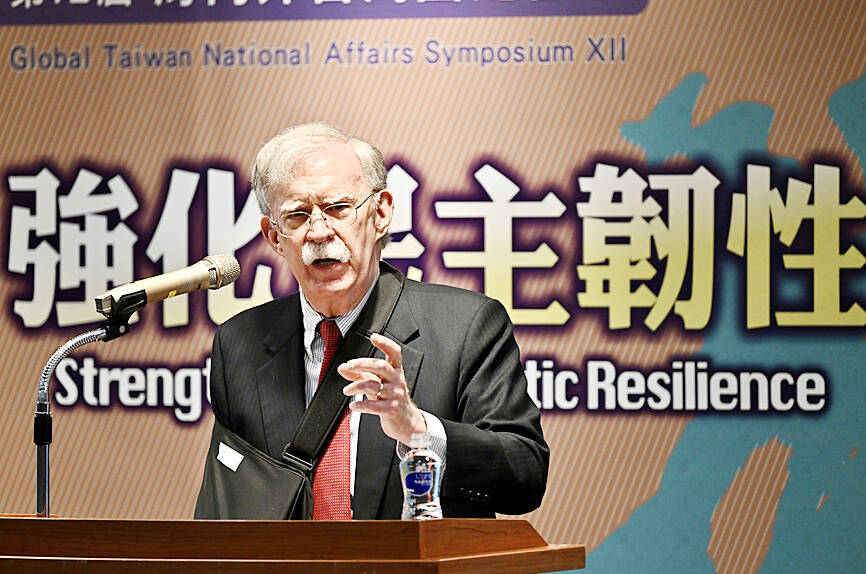The US must warn China of the severe consequences of taking military action against Taiwan, former US national security adviser John Bolton said in Taipei yesterday.
Bolton made the remarks while giving the keynote address at the World Taiwanese Congress’ annual meeting.
He added that the US must work closer with Taiwan and allied countries in Asia on national security to counter Chinese aggression, and ensure that Taiwan remains a free and democratic country.

Photo: George Tsorng, Taipei Times
“People thought Ukraine could not fight, they say it’s just part of Russia historically, whereas in fact, Ukrainians have fought with skill, morale and effectiveness,” said Bolton, who also served as US ambassador to the UN.
It would be the same for Taiwan, he said.
“Will Taiwan fight for its independence?” he asked, as people in the audience shouted: “Yes, we will.”
“That is the right answer,” Bolton said, smiling as people applauded in the conference room.
“That’s what China has to understand, that the people here believe in governing themselves, and they are not going to give it up, and it’s important that is communicated to the US. So when commentators said that Taiwanese are using Americans’ support, but they are not really prepared to defend themselves ... that is wrong. If it came to military action, then Taiwan would fight,” he said.
Bolton criticized politicians and commentators in the US and around the world who he said claim Taiwan is being provocative.
China is the aggressor, always threatening Taiwan and other countries in the region, he said.
“Strength is not provocative; weakness is provocative,” Bolton said.
Weakness is what needs to be avoided in Taiwan, he said, urging the US to help Taiwan to bolster its military capabilities.
“We need to do more to convince [Chinese President] Xi Jinping [習近平], that he cannot prevail” and that an attack on Taiwan would have heavy consequences for China, Bolton said.
The US should recognize Taiwan, he added.
When Taiwan was expelled from the UN in 1971, former US president George H.W. Bush was the US ambassador to the UN and he supported dual recognition, so that Taiwan could keep its seat in the UN, but the idea was rejected by Taiwan and China at the time, Bolton said.
“But now dual recognition makes sense from the US perspective, though it could be displeasing to Bejing, but that’s the point [we must make], to show that relations between the US and Taiwan are fixed, and will not go away,” he said.
Even now in the absence of full recognition, richer strategic dialogues between Taiwanese and US officials are needed, not just between diplomats, but also those in the military and intelligence fields, so that the two national security teams can coordinate, Bolton said.
Other allied countries must also be involved in contingency planning, to assess what China might do and how to respond, he said.
“If an attack takes place, then it’s too late,” he said.
If Taiwan pressed for more national security discussions, it would have a greater chance of deterring Chinese aggression or defending itself, he said.

AGING: As of last month, people aged 65 or older accounted for 20.06 percent of the total population and the number of couples who got married fell by 18,685 from 2024 Taiwan has surpassed South Korea as the country least willing to have children, with an annual crude birthrate of 4.62 per 1,000 people, Ministry of the Interior data showed yesterday. The nation was previously ranked the second-lowest country in terms of total fertility rate, or the average number of children a woman has in her lifetime. However, South Korea’s fertility rate began to recover from 2023, with total fertility rate rising from 0.72 and estimated to reach 0.82 to 0.85 by last year, and the crude birthrate projected at 6.7 per 1,000 people. Japan’s crude birthrate was projected to fall below six,

Conflict with Taiwan could leave China with “massive economic disruption, catastrophic military losses, significant social unrest, and devastating sanctions,” a US think tank said in a report released on Monday. The German Marshall Fund released a report titled If China Attacks Taiwan: The Consequences for China of “Minor Conflict” and “Major War” Scenarios. The report details the “massive” economic, military, social and international costs to China in the event of a minor conflict or major war with Taiwan, estimating that the Chinese People’s Liberation Army (PLA) could sustain losses of more than half of its active-duty ground forces, including 100,000 troops. Understanding Chinese

US President Donald Trump in an interview with the New York Times published on Thursday said that “it’s up to” Chinese President Xi Jinping (習近平) what China does on Taiwan, but that he would be “very unhappy” with a change in the “status quo.” “He [Xi] considers it to be a part of China, and that’s up to him what he’s going to be doing, but I’ve expressed to him that I would be very unhappy if he did that, and I don’t think he’ll do that. I hope he doesn’t do that,” Trump said. Trump made the comments in the context

SELF-DEFENSE: Tokyo has accelerated its spending goal and its defense minister said the nation needs to discuss whether it should develop nuclear-powered submarines China is ramping up objections to what it sees as Japan’s desire to acquire nuclear weapons, despite Tokyo’s longstanding renunciation of such arms, deepening another fissure in the two neighbors’ increasingly tense ties. In what appears to be a concerted effort, China’s foreign and defense ministries issued statements on Thursday condemning alleged remilitarism efforts by Tokyo. The remarks came as two of the country’s top think tanks jointly issued a 29-page report framing actions by “right-wing forces” in Japan as posing a “serious threat” to world peace. While that report did not define “right-wing forces,” the Chinese Ministry of Foreign Affairs was